Cross-Cultural Leadership Skills Workshop Development Project
VerifiedAdded on 2022/08/24
|8
|1465
|18
Project
AI Summary
This project details the development of a cross-cultural leadership workshop designed for Australian-based leaders doing business in Bhutan. The workshop aims to equip leaders with the necessary skills and knowledge to navigate cultural differences, improve communication, and enhance their leadership approach in a new cultural context. The project outlines the workshop's objectives, which include developing language and workplace culture knowledge, instilling appropriate leadership approaches, and identifying potential drawbacks in current leadership styles. The workshop agenda includes activities such as cultural briefings, speech therapy to overcome language barriers, and discussions on leadership approaches prevalent in Bhutan. The project emphasizes the importance of understanding Bhutanese culture and organizational norms to improve the performance of Australian leaders. The project provides a framework for a comprehensive workshop, integrating various exercises to enhance cross-cultural understanding and leadership effectiveness.
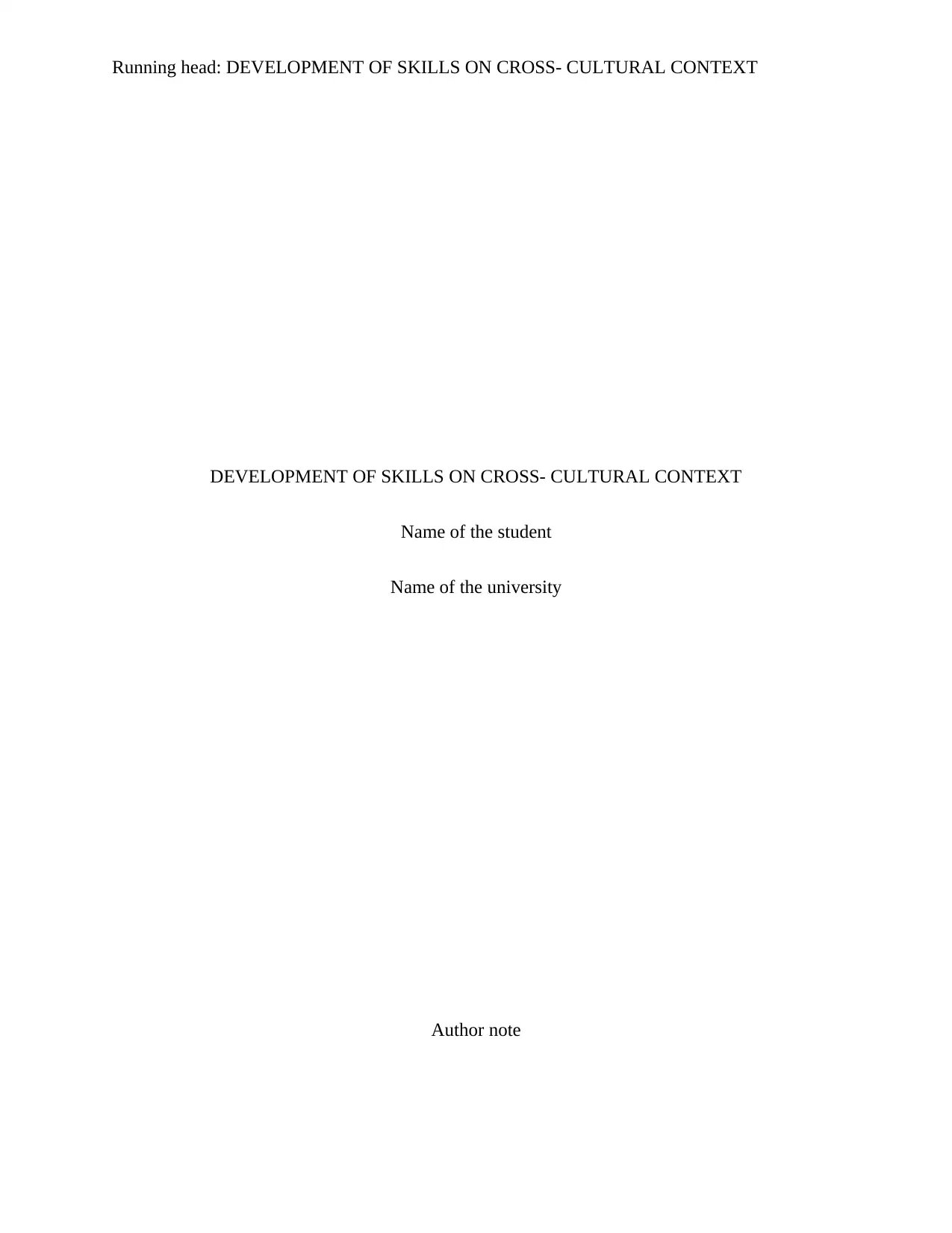
Running head: DEVELOPMENT OF SKILLS ON CROSS- CULTURAL CONTEXT
DEVELOPMENT OF SKILLS ON CROSS- CULTURAL CONTEXT
Name of the student
Name of the university
Author note
DEVELOPMENT OF SKILLS ON CROSS- CULTURAL CONTEXT
Name of the student
Name of the university
Author note
Paraphrase This Document
Need a fresh take? Get an instant paraphrase of this document with our AI Paraphraser
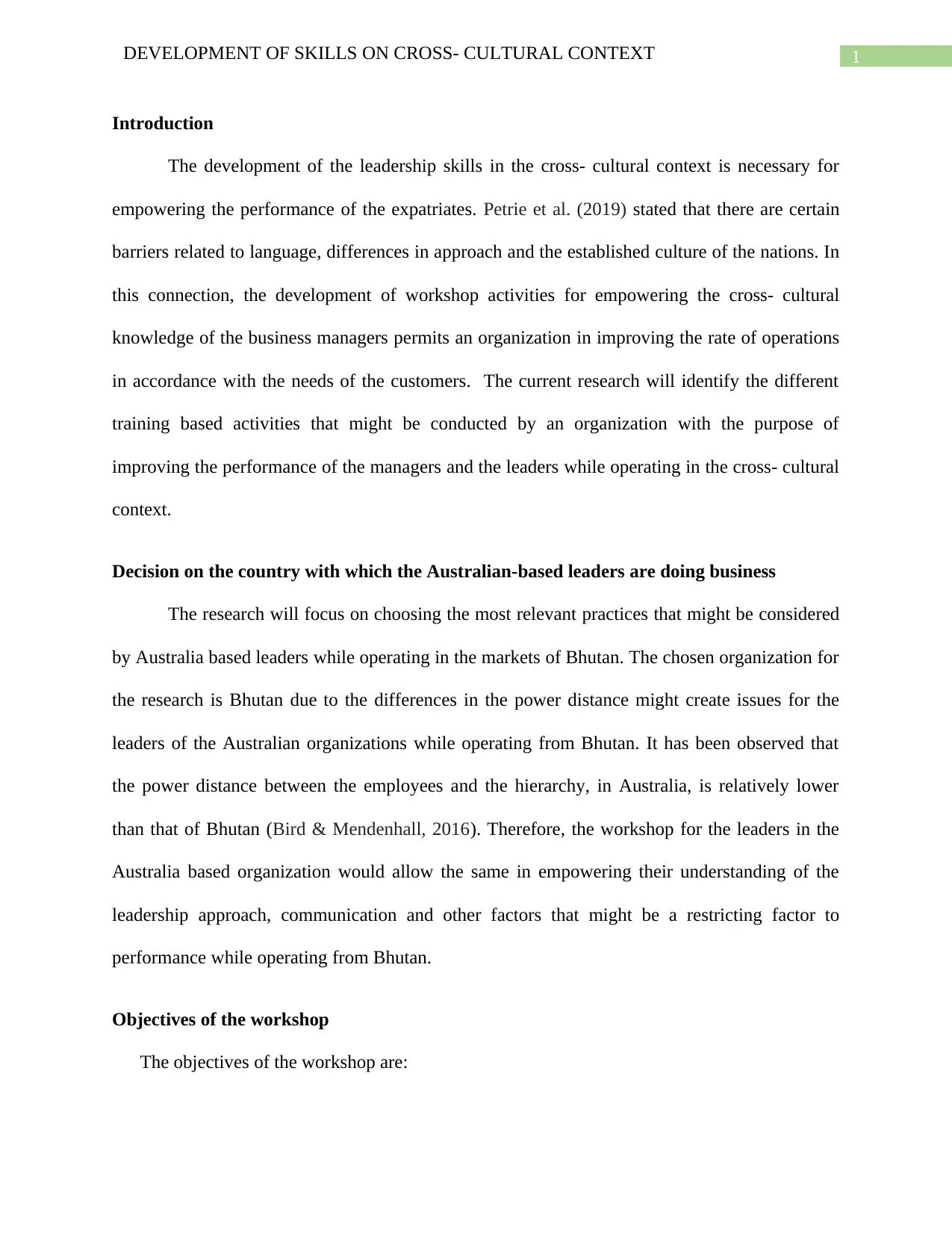
1DEVELOPMENT OF SKILLS ON CROSS- CULTURAL CONTEXT
Introduction
The development of the leadership skills in the cross- cultural context is necessary for
empowering the performance of the expatriates. Petrie et al. (2019) stated that there are certain
barriers related to language, differences in approach and the established culture of the nations. In
this connection, the development of workshop activities for empowering the cross- cultural
knowledge of the business managers permits an organization in improving the rate of operations
in accordance with the needs of the customers. The current research will identify the different
training based activities that might be conducted by an organization with the purpose of
improving the performance of the managers and the leaders while operating in the cross- cultural
context.
Decision on the country with which the Australian-based leaders are doing business
The research will focus on choosing the most relevant practices that might be considered
by Australia based leaders while operating in the markets of Bhutan. The chosen organization for
the research is Bhutan due to the differences in the power distance might create issues for the
leaders of the Australian organizations while operating from Bhutan. It has been observed that
the power distance between the employees and the hierarchy, in Australia, is relatively lower
than that of Bhutan (Bird & Mendenhall, 2016). Therefore, the workshop for the leaders in the
Australia based organization would allow the same in empowering their understanding of the
leadership approach, communication and other factors that might be a restricting factor to
performance while operating from Bhutan.
Objectives of the workshop
The objectives of the workshop are:
Introduction
The development of the leadership skills in the cross- cultural context is necessary for
empowering the performance of the expatriates. Petrie et al. (2019) stated that there are certain
barriers related to language, differences in approach and the established culture of the nations. In
this connection, the development of workshop activities for empowering the cross- cultural
knowledge of the business managers permits an organization in improving the rate of operations
in accordance with the needs of the customers. The current research will identify the different
training based activities that might be conducted by an organization with the purpose of
improving the performance of the managers and the leaders while operating in the cross- cultural
context.
Decision on the country with which the Australian-based leaders are doing business
The research will focus on choosing the most relevant practices that might be considered
by Australia based leaders while operating in the markets of Bhutan. The chosen organization for
the research is Bhutan due to the differences in the power distance might create issues for the
leaders of the Australian organizations while operating from Bhutan. It has been observed that
the power distance between the employees and the hierarchy, in Australia, is relatively lower
than that of Bhutan (Bird & Mendenhall, 2016). Therefore, the workshop for the leaders in the
Australia based organization would allow the same in empowering their understanding of the
leadership approach, communication and other factors that might be a restricting factor to
performance while operating from Bhutan.
Objectives of the workshop
The objectives of the workshop are:
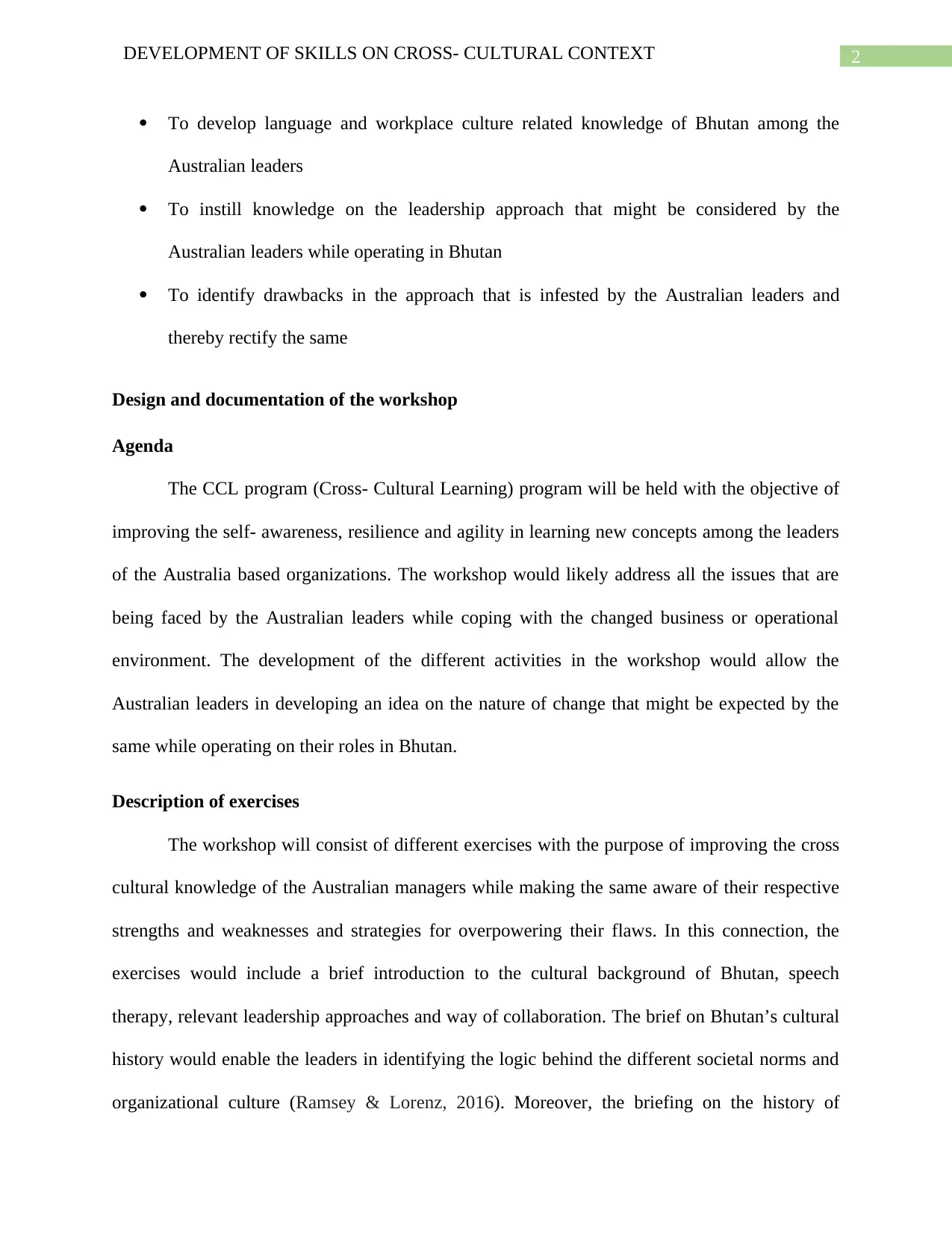
2DEVELOPMENT OF SKILLS ON CROSS- CULTURAL CONTEXT
To develop language and workplace culture related knowledge of Bhutan among the
Australian leaders
To instill knowledge on the leadership approach that might be considered by the
Australian leaders while operating in Bhutan
To identify drawbacks in the approach that is infested by the Australian leaders and
thereby rectify the same
Design and documentation of the workshop
Agenda
The CCL program (Cross- Cultural Learning) program will be held with the objective of
improving the self- awareness, resilience and agility in learning new concepts among the leaders
of the Australia based organizations. The workshop would likely address all the issues that are
being faced by the Australian leaders while coping with the changed business or operational
environment. The development of the different activities in the workshop would allow the
Australian leaders in developing an idea on the nature of change that might be expected by the
same while operating on their roles in Bhutan.
Description of exercises
The workshop will consist of different exercises with the purpose of improving the cross
cultural knowledge of the Australian managers while making the same aware of their respective
strengths and weaknesses and strategies for overpowering their flaws. In this connection, the
exercises would include a brief introduction to the cultural background of Bhutan, speech
therapy, relevant leadership approaches and way of collaboration. The brief on Bhutan’s cultural
history would enable the leaders in identifying the logic behind the different societal norms and
organizational culture (Ramsey & Lorenz, 2016). Moreover, the briefing on the history of
To develop language and workplace culture related knowledge of Bhutan among the
Australian leaders
To instill knowledge on the leadership approach that might be considered by the
Australian leaders while operating in Bhutan
To identify drawbacks in the approach that is infested by the Australian leaders and
thereby rectify the same
Design and documentation of the workshop
Agenda
The CCL program (Cross- Cultural Learning) program will be held with the objective of
improving the self- awareness, resilience and agility in learning new concepts among the leaders
of the Australia based organizations. The workshop would likely address all the issues that are
being faced by the Australian leaders while coping with the changed business or operational
environment. The development of the different activities in the workshop would allow the
Australian leaders in developing an idea on the nature of change that might be expected by the
same while operating on their roles in Bhutan.
Description of exercises
The workshop will consist of different exercises with the purpose of improving the cross
cultural knowledge of the Australian managers while making the same aware of their respective
strengths and weaknesses and strategies for overpowering their flaws. In this connection, the
exercises would include a brief introduction to the cultural background of Bhutan, speech
therapy, relevant leadership approaches and way of collaboration. The brief on Bhutan’s cultural
history would enable the leaders in identifying the logic behind the different societal norms and
organizational culture (Ramsey & Lorenz, 2016). Moreover, the briefing on the history of
⊘ This is a preview!⊘
Do you want full access?
Subscribe today to unlock all pages.

Trusted by 1+ million students worldwide
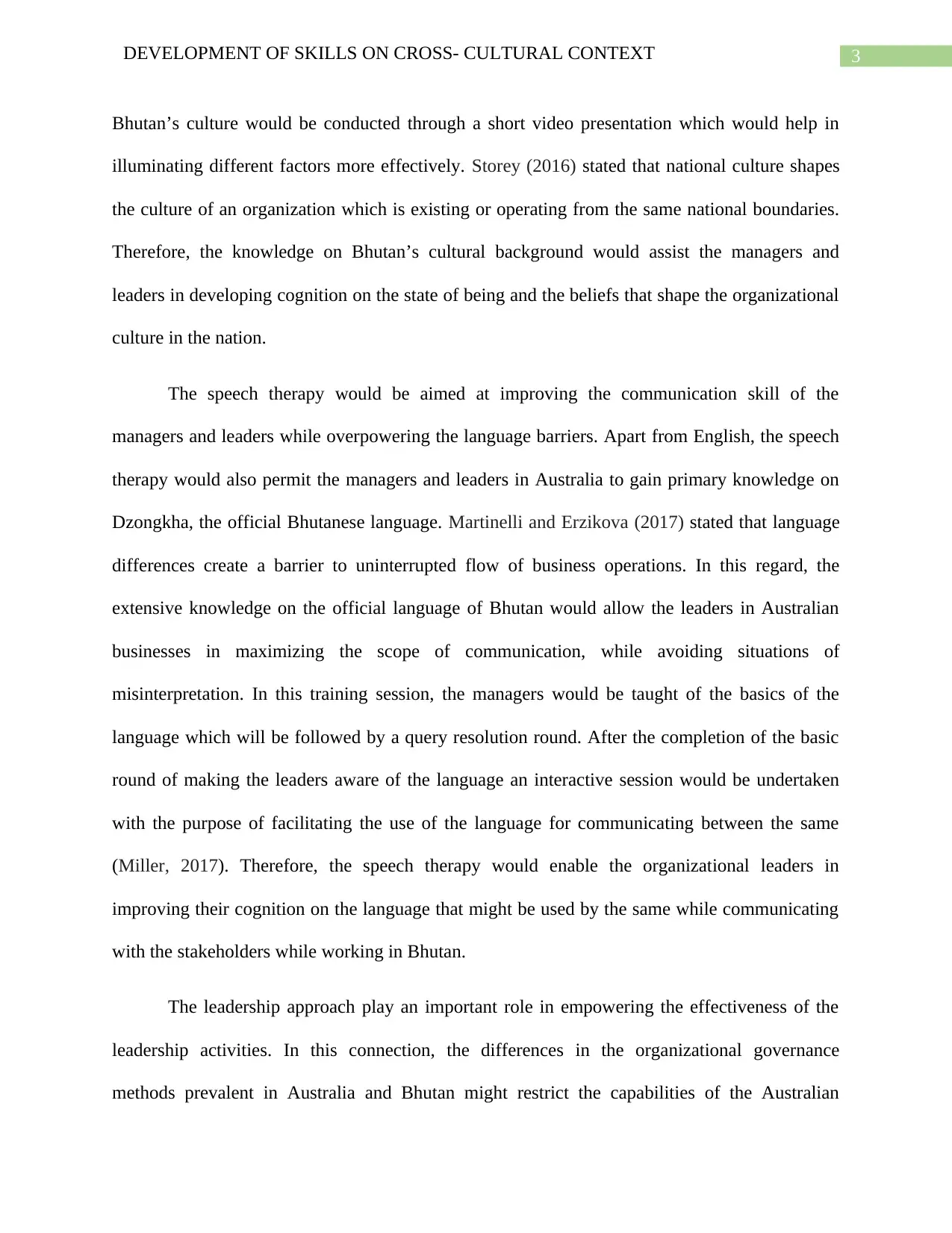
3DEVELOPMENT OF SKILLS ON CROSS- CULTURAL CONTEXT
Bhutan’s culture would be conducted through a short video presentation which would help in
illuminating different factors more effectively. Storey (2016) stated that national culture shapes
the culture of an organization which is existing or operating from the same national boundaries.
Therefore, the knowledge on Bhutan’s cultural background would assist the managers and
leaders in developing cognition on the state of being and the beliefs that shape the organizational
culture in the nation.
The speech therapy would be aimed at improving the communication skill of the
managers and leaders while overpowering the language barriers. Apart from English, the speech
therapy would also permit the managers and leaders in Australia to gain primary knowledge on
Dzongkha, the official Bhutanese language. Martinelli and Erzikova (2017) stated that language
differences create a barrier to uninterrupted flow of business operations. In this regard, the
extensive knowledge on the official language of Bhutan would allow the leaders in Australian
businesses in maximizing the scope of communication, while avoiding situations of
misinterpretation. In this training session, the managers would be taught of the basics of the
language which will be followed by a query resolution round. After the completion of the basic
round of making the leaders aware of the language an interactive session would be undertaken
with the purpose of facilitating the use of the language for communicating between the same
(Miller, 2017). Therefore, the speech therapy would enable the organizational leaders in
improving their cognition on the language that might be used by the same while communicating
with the stakeholders while working in Bhutan.
The leadership approach play an important role in empowering the effectiveness of the
leadership activities. In this connection, the differences in the organizational governance
methods prevalent in Australia and Bhutan might restrict the capabilities of the Australian
Bhutan’s culture would be conducted through a short video presentation which would help in
illuminating different factors more effectively. Storey (2016) stated that national culture shapes
the culture of an organization which is existing or operating from the same national boundaries.
Therefore, the knowledge on Bhutan’s cultural background would assist the managers and
leaders in developing cognition on the state of being and the beliefs that shape the organizational
culture in the nation.
The speech therapy would be aimed at improving the communication skill of the
managers and leaders while overpowering the language barriers. Apart from English, the speech
therapy would also permit the managers and leaders in Australia to gain primary knowledge on
Dzongkha, the official Bhutanese language. Martinelli and Erzikova (2017) stated that language
differences create a barrier to uninterrupted flow of business operations. In this regard, the
extensive knowledge on the official language of Bhutan would allow the leaders in Australian
businesses in maximizing the scope of communication, while avoiding situations of
misinterpretation. In this training session, the managers would be taught of the basics of the
language which will be followed by a query resolution round. After the completion of the basic
round of making the leaders aware of the language an interactive session would be undertaken
with the purpose of facilitating the use of the language for communicating between the same
(Miller, 2017). Therefore, the speech therapy would enable the organizational leaders in
improving their cognition on the language that might be used by the same while communicating
with the stakeholders while working in Bhutan.
The leadership approach play an important role in empowering the effectiveness of the
leadership activities. In this connection, the differences in the organizational governance
methods prevalent in Australia and Bhutan might restrict the capabilities of the Australian
Paraphrase This Document
Need a fresh take? Get an instant paraphrase of this document with our AI Paraphraser
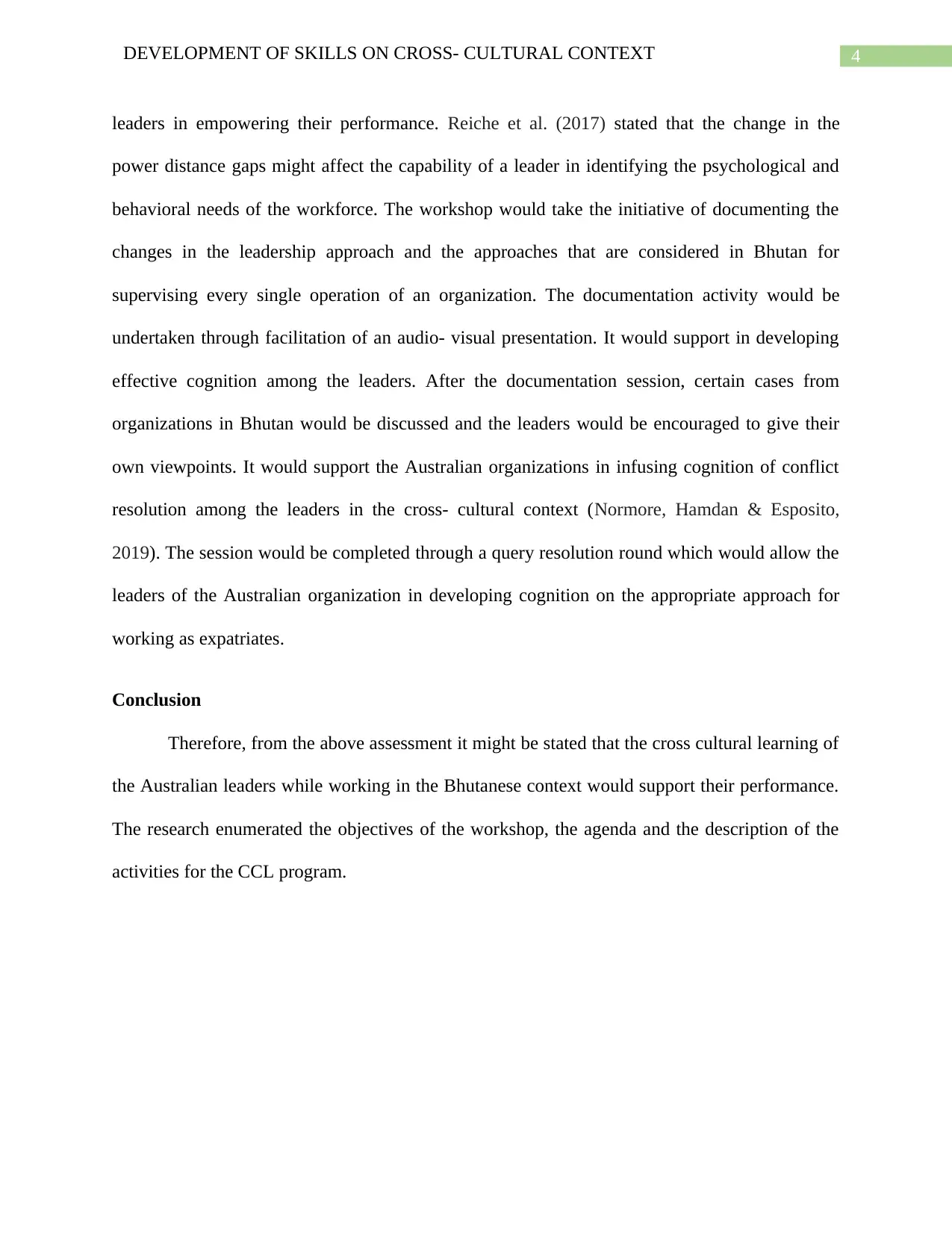
4DEVELOPMENT OF SKILLS ON CROSS- CULTURAL CONTEXT
leaders in empowering their performance. Reiche et al. (2017) stated that the change in the
power distance gaps might affect the capability of a leader in identifying the psychological and
behavioral needs of the workforce. The workshop would take the initiative of documenting the
changes in the leadership approach and the approaches that are considered in Bhutan for
supervising every single operation of an organization. The documentation activity would be
undertaken through facilitation of an audio- visual presentation. It would support in developing
effective cognition among the leaders. After the documentation session, certain cases from
organizations in Bhutan would be discussed and the leaders would be encouraged to give their
own viewpoints. It would support the Australian organizations in infusing cognition of conflict
resolution among the leaders in the cross- cultural context (Normore, Hamdan & Esposito,
2019). The session would be completed through a query resolution round which would allow the
leaders of the Australian organization in developing cognition on the appropriate approach for
working as expatriates.
Conclusion
Therefore, from the above assessment it might be stated that the cross cultural learning of
the Australian leaders while working in the Bhutanese context would support their performance.
The research enumerated the objectives of the workshop, the agenda and the description of the
activities for the CCL program.
leaders in empowering their performance. Reiche et al. (2017) stated that the change in the
power distance gaps might affect the capability of a leader in identifying the psychological and
behavioral needs of the workforce. The workshop would take the initiative of documenting the
changes in the leadership approach and the approaches that are considered in Bhutan for
supervising every single operation of an organization. The documentation activity would be
undertaken through facilitation of an audio- visual presentation. It would support in developing
effective cognition among the leaders. After the documentation session, certain cases from
organizations in Bhutan would be discussed and the leaders would be encouraged to give their
own viewpoints. It would support the Australian organizations in infusing cognition of conflict
resolution among the leaders in the cross- cultural context (Normore, Hamdan & Esposito,
2019). The session would be completed through a query resolution round which would allow the
leaders of the Australian organization in developing cognition on the appropriate approach for
working as expatriates.
Conclusion
Therefore, from the above assessment it might be stated that the cross cultural learning of
the Australian leaders while working in the Bhutanese context would support their performance.
The research enumerated the objectives of the workshop, the agenda and the description of the
activities for the CCL program.
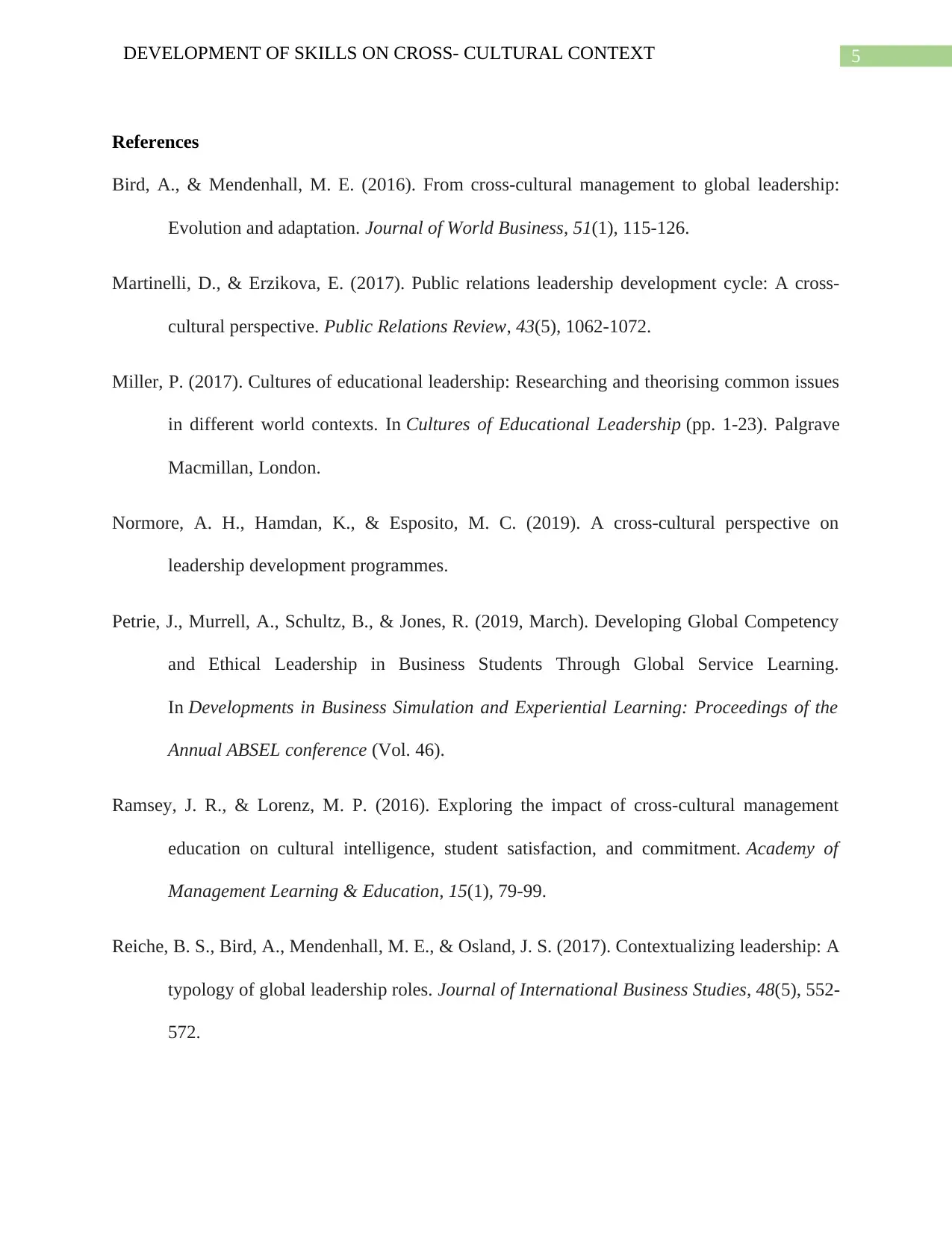
5DEVELOPMENT OF SKILLS ON CROSS- CULTURAL CONTEXT
References
Bird, A., & Mendenhall, M. E. (2016). From cross-cultural management to global leadership:
Evolution and adaptation. Journal of World Business, 51(1), 115-126.
Martinelli, D., & Erzikova, E. (2017). Public relations leadership development cycle: A cross-
cultural perspective. Public Relations Review, 43(5), 1062-1072.
Miller, P. (2017). Cultures of educational leadership: Researching and theorising common issues
in different world contexts. In Cultures of Educational Leadership (pp. 1-23). Palgrave
Macmillan, London.
Normore, A. H., Hamdan, K., & Esposito, M. C. (2019). A cross-cultural perspective on
leadership development programmes.
Petrie, J., Murrell, A., Schultz, B., & Jones, R. (2019, March). Developing Global Competency
and Ethical Leadership in Business Students Through Global Service Learning.
In Developments in Business Simulation and Experiential Learning: Proceedings of the
Annual ABSEL conference (Vol. 46).
Ramsey, J. R., & Lorenz, M. P. (2016). Exploring the impact of cross-cultural management
education on cultural intelligence, student satisfaction, and commitment. Academy of
Management Learning & Education, 15(1), 79-99.
Reiche, B. S., Bird, A., Mendenhall, M. E., & Osland, J. S. (2017). Contextualizing leadership: A
typology of global leadership roles. Journal of International Business Studies, 48(5), 552-
572.
References
Bird, A., & Mendenhall, M. E. (2016). From cross-cultural management to global leadership:
Evolution and adaptation. Journal of World Business, 51(1), 115-126.
Martinelli, D., & Erzikova, E. (2017). Public relations leadership development cycle: A cross-
cultural perspective. Public Relations Review, 43(5), 1062-1072.
Miller, P. (2017). Cultures of educational leadership: Researching and theorising common issues
in different world contexts. In Cultures of Educational Leadership (pp. 1-23). Palgrave
Macmillan, London.
Normore, A. H., Hamdan, K., & Esposito, M. C. (2019). A cross-cultural perspective on
leadership development programmes.
Petrie, J., Murrell, A., Schultz, B., & Jones, R. (2019, March). Developing Global Competency
and Ethical Leadership in Business Students Through Global Service Learning.
In Developments in Business Simulation and Experiential Learning: Proceedings of the
Annual ABSEL conference (Vol. 46).
Ramsey, J. R., & Lorenz, M. P. (2016). Exploring the impact of cross-cultural management
education on cultural intelligence, student satisfaction, and commitment. Academy of
Management Learning & Education, 15(1), 79-99.
Reiche, B. S., Bird, A., Mendenhall, M. E., & Osland, J. S. (2017). Contextualizing leadership: A
typology of global leadership roles. Journal of International Business Studies, 48(5), 552-
572.
⊘ This is a preview!⊘
Do you want full access?
Subscribe today to unlock all pages.

Trusted by 1+ million students worldwide
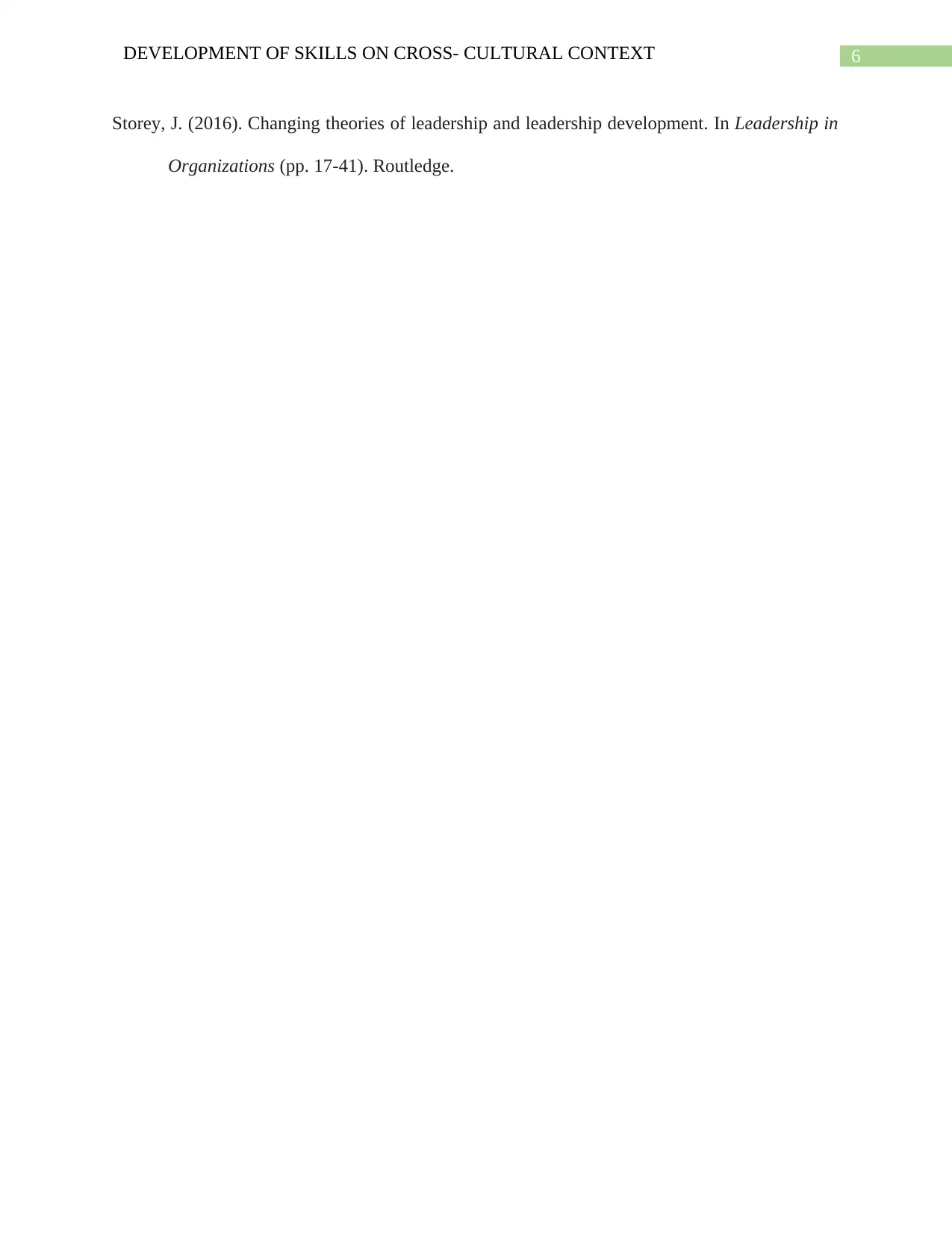
6DEVELOPMENT OF SKILLS ON CROSS- CULTURAL CONTEXT
Storey, J. (2016). Changing theories of leadership and leadership development. In Leadership in
Organizations (pp. 17-41). Routledge.
Storey, J. (2016). Changing theories of leadership and leadership development. In Leadership in
Organizations (pp. 17-41). Routledge.
Paraphrase This Document
Need a fresh take? Get an instant paraphrase of this document with our AI Paraphraser

7DEVELOPMENT OF SKILLS ON CROSS- CULTURAL CONTEXT
1 out of 8
Related Documents
Your All-in-One AI-Powered Toolkit for Academic Success.
+13062052269
info@desklib.com
Available 24*7 on WhatsApp / Email
![[object Object]](/_next/static/media/star-bottom.7253800d.svg)
Unlock your academic potential
Copyright © 2020–2026 A2Z Services. All Rights Reserved. Developed and managed by ZUCOL.





